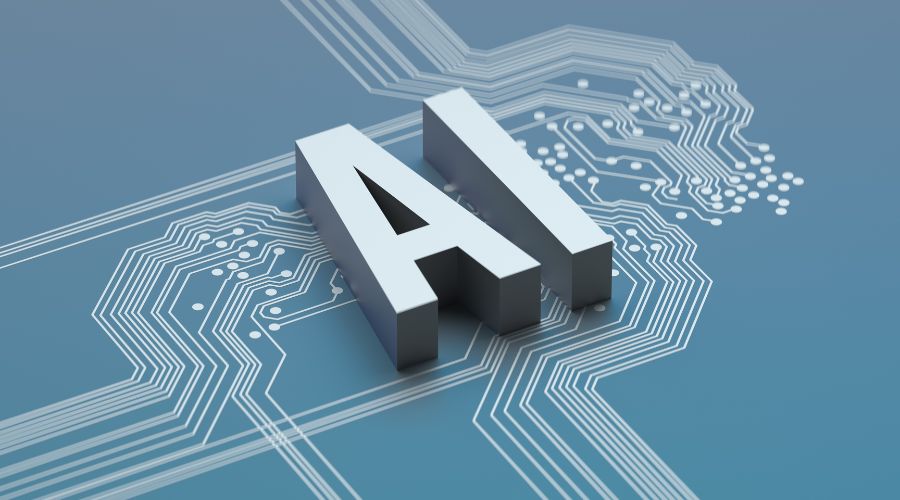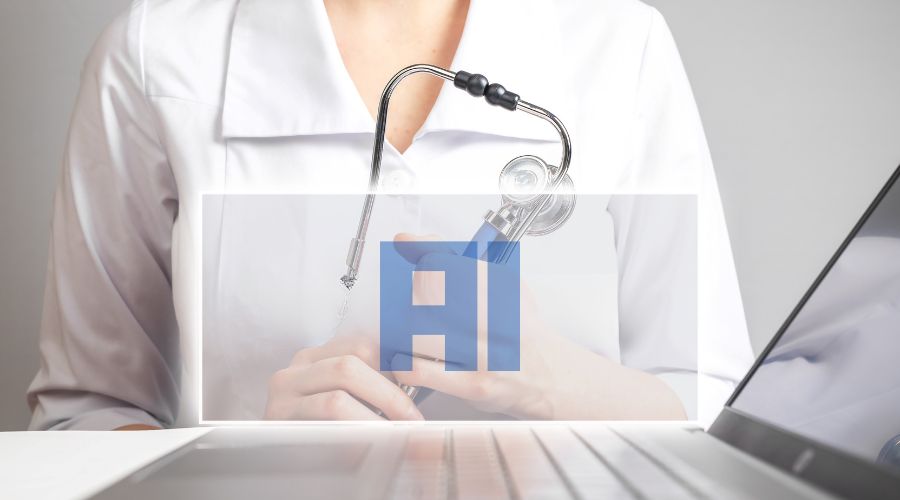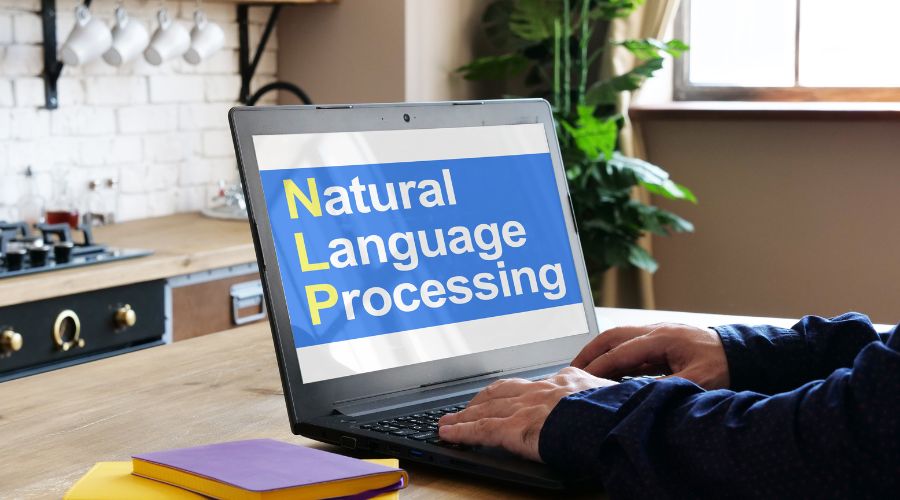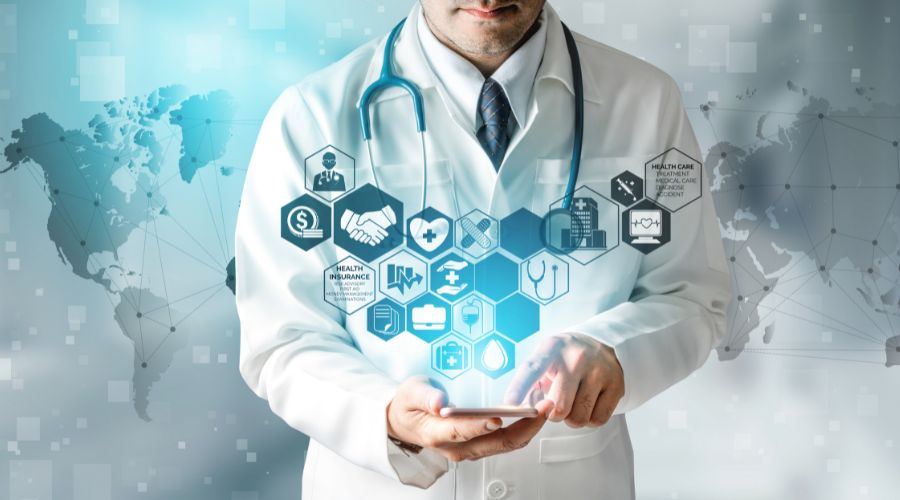Artificial Intelligence (AI) is a powerful force that is transforming how we diagnose, treat, and manage medical diseases in the ever-evolving world of healthcare. AI is quickly establishing itself as a game-changing technology with enormous potential for the future of healthcare because of its unmatched capacity to analyse vast quantities of data, spot patterns, and make intelligent judgements.
Imagine a future where illnesses are identified before they appear, treatment regimens are individualised based on each patient’s genetic profile, and administrative duties are expertly managed to free up medical staff to concentrate on patient care. In the field of healthcare, AI is starting to build a world like this.
In this blog, we explore artificial intelligence’s fascinating position in healthcare and look at some of its many applications that are transforming how we think about well-being. Every aspect of healthcare services is being impacted by AI, from diagnostics to remote patient monitoring. Join us as we explore the crucial ways that AI is advancing not just medical procedures but also patient experiences and results, ushering in a new era of precision medicine and unmatched creativity.
What is Artificial Intelligence?

AI, as it is generally referred to, is the emulation of human cognitive functions by computers, particularly computer systems. It includes a wide range of tools and methods that provide computers with the ability to do things like understand spoken language, spot patterns, tackle challenging issues, and make judgement calls. Through machine learning algorithms, AI systems learn from data, adjust to fresh inputs, and gradually enhance their performance. These algorithms provide AI with the ability to sift through enormous volumes of data, spot trends, and develop insights, enabling it to do jobs like picture and speech recognition, medical diagnosis, and autonomous decision-making.
With IBM’s Watson system, which was first created to deliver prompt and accurate responses to queries, the path towards utilising artificial intelligence for healthcare began. The development of AI in healthcare was notably characterised by IBM’s 2011 release of a healthcare-focused iteration of Watson. This iteration of Watson focused on developing natural language processing, a technology essential to understanding and decoding human communication. In the current environment, the effect of AI goes beyond IBM as industry giants like Apple, Microsoft, and Amazon gradually direct their resources into cutting-edge AI solutions designed to improve the healthcare sector.
The Impact of Artificial Intelligence on Healthcare:
1. Improvements in Diagnosis and Therapy

In terms of diagnosis and therapy, AI has proven to be revolutionary. How medical practitioners approach their work is changing due to AI algorithms’ capacity to quickly and accurately process and analyse enormous volumes of medical data. For example, radiologists can benefit from AI-driven image identification systems that can spot irregularities in X-rays, MRIs, and other medical pictures. With this help, the diagnostic procedure is not only sped up but also made more accurate, making sure that any possible problems are not missed.
AI is essential for generating individualised treatment approaches beyond testing. It is able to suggest customised therapies that have a better chance of success by analysing patient-specific data and comparing it to scientific studies. This personalised strategy maximises therapy efficacy while minimising side effects.
2. Predictive Analytics
 Electronic health records, patient histories, and other sources of data are frequently a surge for the healthcare sector. Healthcare professionals may gain valuable insights from this data and anticipate possible public health issues thanks to AI’s predictive analytics capabilities. AI algorithms can aid in resource allocation, anticipate disease outbreaks, and develop preventative measures by spotting patterns and trends. The public’s health may be greatly impacted by this proactive approach to healthcare management, which can also improve results and lessen the burden on healthcare systems.
Electronic health records, patient histories, and other sources of data are frequently a surge for the healthcare sector. Healthcare professionals may gain valuable insights from this data and anticipate possible public health issues thanks to AI’s predictive analytics capabilities. AI algorithms can aid in resource allocation, anticipate disease outbreaks, and develop preventative measures by spotting patterns and trends. The public’s health may be greatly impacted by this proactive approach to healthcare management, which can also improve results and lessen the burden on healthcare systems. 3. Drug Development and Research

Traditionally a time-consuming and expensive procedure, AI is accelerating medication research and development. Such a type of model can more quickly find possible medication candidates since it can analyse large datasets and simulate intricate chemical interactions. In the end, this leads to a speedier approval of novel pharmaceuticals by accelerating the selection of compounds for additional testing that show potential. The pharmaceutical business might undergo a revolution by becoming more effective and efficient thanks to the incorporation of AI in medication development.
4. Personalised Medicine

Precision medicine, also termed personalised medicine, is a ground-breaking strategy that customises medical treatments for specific individuals based on their genetic makeup, way of life, and medical background. Healthcare professionals may deliver therapies that are individually tailored to each patient’s individual needs thanks to AI’s capacity to process and analyse large amounts of patient data. By lowering the probability of adverse responses, this strategy not only increases the effectiveness of the therapy but also improves patient safety and satisfaction.
5. Administrative Efficiency
 Healthcare institutions are using AI’s potential to streamline administrative operations, which is boosting productivity and improving patient experiences. AI-driven chatbots and virtual assistants may schedule appointments, address patient inquiries, and handle billing procedures. The automation of ordinary tasks frees healthcare workers to concentrate on more difficult and crucial duties. Quicker replies and more seamless interactions are in the patient’s best interests, increasing overall happiness.
Healthcare institutions are using AI’s potential to streamline administrative operations, which is boosting productivity and improving patient experiences. AI-driven chatbots and virtual assistants may schedule appointments, address patient inquiries, and handle billing procedures. The automation of ordinary tasks frees healthcare workers to concentrate on more difficult and crucial duties. Quicker replies and more seamless interactions are in the patient’s best interests, increasing overall happiness. 6. Remote Monitoring and Telehealth

The emergence of wearable AI-powered gadgets has revolutionised patient monitoring and management, particularly for chronic illnesses and post-operative rehabilitation. These gadgets continually gather health-related data and provide it to medical professionals in real time. This remote monitoring makes sure that medical experts can act quickly if any worrying developments take place. Additionally, AI-enabled telehealth systems are making it possible for remote consultations, which let patients get medical advice and direction without having to go to a doctor’s office in person. This is especially helpful for people who have trouble getting about or for individuals who live in remote places with little access to medical services.
Real-time health monitoring has been revolutionised by wearable technologies. Users’ vital signs, activity levels, and sleep patterns are continually recorded by devices like smartwatches and fitness trackers. These data may be interpreted by AI algorithms to provide information about the health state of individuals and even identify possible health problems before they manifest. Individuals are empowered to take ownership of their health and seek medical care when necessary thanks to this proactive attitude.
7. Fraud Detection and Security

Security and fraud protection is crucial in the increasingly digital healthcare industry. Medical bills, insurance claims, and financial transactions are all subject to AI algorithms that look for abnormalities and strange trends. By taking a proactive approach, you can spot possible fraud and save consumers and healthcare providers from financial harm. AI ensures that resources are used for proper medical objectives by safeguarding the integrity of the healthcare system.
8. Processing Natural Language for Patient Records

Unstructured healthcare data, such as doctor’s notes and medical records, may be analysed and important insights extracted using AI-powered natural language processing (NLP). This helps in developing thorough patient profiles, spotting trends in the development of diseases, and even foretelling impending consequences. Additionally, NLP technology can help automate the administrative burden on healthcare providers.
The Demartis of Artificial Intelligence in Healthcare:

- Data Privacy and Security Concerns: The massive patient data sharing necessary for AI integration poses serious privacy issues and the possibility of data breaches, necessitating strong security measures.
- Technical Application Challenges: Significant expenditures in infrastructure, knowledge, and training are required for successful AI applications. It can be difficult for smaller healthcare institutions to deploy and operate AI technologies.
- Diminished Human Engagement: As AI simplifies administrative duties, concerns are raised regarding the possible impact on the patient-provider relationship of diminished human engagement in patient care.
- Diagnostic Reliability: The calibre and variety of training data have a significant impact on the diagnostic precision of AI. Misdiagnoses or suggestions for ineffective treatments might result from biassed or inadequate data.
- Ethical Difficulties: The application of AI poses ethical questions about algorithmic decision-making, notably in situations like patient prioritisation or end-of-life care decisions.
- Job Displacement: Although AI improves efficiency, it has the potential to cause a loss of employment among healthcare professionals who do mundane administrative chores.
- Dependence and Overreliance: An overreliance on AI might compromise sound judgement in the medical field and result in an overly dependent healthcare system.
What Type Of AI Is Used In The Healthcare Industry?

Artificial intelligence (AI) is used in healthcare to handle a variety of issues and activities. The following are some of the primary AI applications in healthcare:
- Narrow or Weak AI: This sort of AI is often used in healthcare for activities like picture identification, voice recognition, and natural language processing. It was created to carry out specific tasks. Examples include automated transcription of medical notes and computer-assisted diagnosis from medical imagery.
- Machine learning (ML): This method allows computers to gain knowledge from data and gradually enhance their performance. For tasks like classification (such as illness diagnosis), regression (such as patient outcome prediction), and anomaly detection, supervised learning is employed. Large datasets can include patterns that unsupervised learning can find, providing new knowledge and discoveries.
- Deep Learning: A branch of computer learning, deep learning uses layers of neural networks. It is very effective for jobs like voice and picture recognition. Deep learning is used in the healthcare industry to evaluate medical pictures (such as X-rays and MRIs) and find patterns that would be difficult for a human to see.
- Natural Language Processing (NLP): It is the study of how to produce and comprehend human language. NLP is used in the healthcare industry to extract data from clinical notes, research articles, and medical records. It drives applications like chatbots for patient communication, medical coding, and text-based data mining.
- Computer Vision: Algorithms for computer vision analyse and interpret visual data from pictures and videos. It is used in the healthcare industry to do jobs including diagnosing illnesses with medical imaging, tracking surgical tools during operations, and even keeping an eye on patient movements to prevent falls.
- Predictive Analytics: Utilising previous data to forecast upcoming events or results is known as predictive analytics. This may be done in the healthcare industry by foreseeing patient admission rates, disease outbreaks, medication compliance, and patient deterioration, which aids healthcare practitioners in making proactive plans and interventions.
- Robotics: Robotic systems powered by AI are utilised in patient care, medicine delivery, and procedures (robotic-assisted surgery). These robots are capable of performing precise motions and duties, improving process precision and lowering the possibility of human error.
- Genomic Analysis: AI systems examine genomic data to discover genetic markers linked to illnesses and forecast how each patient will react to therapy. This personalised method of treatment is essential for configuring medicines for each patient’s unique genetic profile.
- Virtual Health Assistants: Virtual health assistants are chatbots or programs with AI that engage with patients, respond to their questions about their health, and provide assistance. They can set up appointments, give reminders for taking medications, and give basic information.
- Data Analytics: To handle and analyse massive amounts of healthcare data, AI-driven data analytics technologies are utilised. This aids researchers and clinicians in finding patterns, correlations, and insights that can guide clinical judgement and research paths.
Future Scope of Artificial Intelligence in Healthcare

Have you ever thought about what the healthcare industry would resemble in a few years if artificial intelligence (AI) were fully implemented? The opportunities are really revolutionary.
A compelling picture is painted by recent patterns and prospects. In keeping with the current adoption surge, Tractica predicts that the use of 22 AI technologies in healthcare will bring in an astounding $8.6 billion in yearly income by 2025.
Healthcare AI’s future is unquestionably bright. The convergence of cutting-edge technology is expected to change the landscape and drive the sector towards greater patient care, simpler procedures, and better results.
The healthcare industry is about to undergo a dramatic transformation. The estimated Compound Annual Growth Rate (CAGR) for the use of AI in this sector is an amazing 44.9% from 2020 to 2026. The industry’s trust in AI’s ability to revolutionise industries is evident from the spike in adoption.
By 2030, it’s expected that AI will provide medical professionals with data-driven insights, reveal hidden underlying causes of illnesses, and offer crucial support in the fields of medicine and supervision.
Final Words
A new age of innovation and efficiency is beginning with the use of artificial intelligence in the healthcare industry. AI’s influence is profound and disruptive, ranging from precise diagnosis and individualised care to drug development and administrative simplification. Healthcare professionals who want to deliver the highest level of care and remain at the forefront of this technological transformation must embrace AI’s promise in order to do so. AI’s influence on healthcare will only grow as it develops, influencing patient care and medical procedures in the future.

